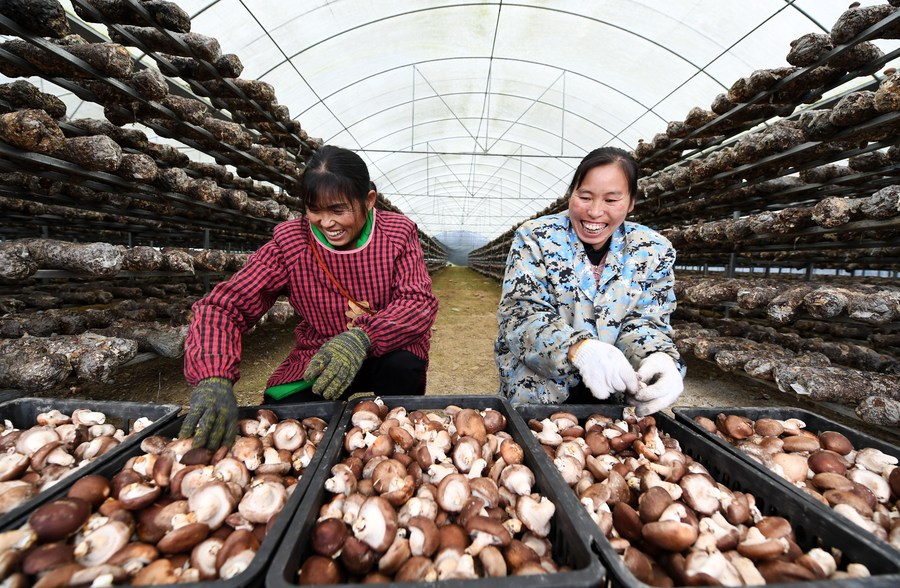
Villagers sort out just-harvested mushrooms at an edible fungus growing base at Minjiachang village, Minxiao township in Jiangkou county of Southwest China's Guizhou province, Jan 3, 2019. [Photo/Xinhua]
For Jeffrey Sachs, one of the world's leading experts in the fight against poverty, China's declaration on Thursday of "complete victory" in eradicating extreme poverty should inspire the whole world.
President Xi Jinping announced the victory at a gathering in Beijing to mark the country's achievements in poverty reduction and honor its model poverty fighters. Over the past eight years, the final 98.99 million impoverished rural residents living under the country's poverty line have bid farewell to poverty.
"China's success should inspire the world to work together to end extreme poverty, drawing on China's experience, including massive investments in education, public health and advanced infrastructure," said Sachs, a professor at Columbia University who served as special adviser to former UN secretaries-general Kofi Annan and Ban Ki-moon.
He stressed that it's a time for global cooperation in a great cause that will benefit all of humanity.
"I hope that China, the European Union and the United States will work together harmoniously and productively in this effort, including investments in 5G, renewable energy and other cutting-edge technologies for the benefit of the poor," said Sachs, whose 2005 book The End of Poverty: Economic Possibilities for Our Time, has inspired many in the poverty fight.
In Russia, Kremlin spokesman Dmitry Peskov applauded China's feat in eradicating poverty.
"China is a big country with a large population. Although the coronavirus has brought difficulties to economic and social development, China managed to maintain a forward trend successfully," Peskov said.
Bernard Dewit, chairman of the Belgian-Chinese Chamber of Commerce, said it's "uplifting" to hear the news when the world is haunted by the COVID-19 crisis, climate change and wars in some countries.
"This is a source of hope for many countries and regions affected by poverty," said Dewit, who has been visiting China since the 1980s. He added that Europe and China should join hands to help those who need it.
Jon Taylor, a professor at the University of Texas at San Antonio, US, and a China scholar, questioned why China's achievements in eliminating extreme poverty got so little attention in the West.
"Irrespective of the debate over the measures employed or where the poverty line is drawn, this is a significant event and needs to be acknowledged by the West," he said.
"To scoff at this notable success is an insult to the Chinese people's hard work to improve their nation's well-being. It also ignores the facts on the ground that the majority of the world's reduction in poverty can be attributed to China," Taylor said.
The World Bank reported that China has contributed more than 70 percent of global poverty reduction since the late 1970s.
Sanro Shiozaki, a Japanese agricultural researcher who had long provided help for apple growers in China's Henan and Shandong provinces, said China's rural areas have changed vastly in the past 20 years due to the poverty reduction policies.
"The Communist Party of China and the Chinese government took strong measures and made efforts to mobilize all kinds of resources in establishing a systematic poverty alleviation mechanism. I think it is an important reason for China's historic achievements in wiping out extreme poverty," said Shiozaki, a laureate of the Chinese government's Friendship Award.
Christopher Bovis, a professor of international business law at the University of Hull in the United Kingdom, said that the first United Nations Millennium Development Goal, the elimination of poverty and the subsequent raising of living standards, has been the focal driver of governments in China amid the need to promote sustainable development and a meaningful and workable balance between free trade and national concerns.
"China's consistent and predictable economic growth has delivered higher incomes for its people, thus impacting significantly on poverty reduction and has been the greatest contribution toward the attainment of the first Millennium Development Goal to eradicate extreme poverty and hunger," he said.
Nawazish Mirza, an associate professor of finance at the Excelia Business School in France, said Xi's explanation of anti-poverty theory was essential to highlight the core values of socialism.
"The poverty eradication policies were people-focused and aimed at improving general well-being and global welfare. The efforts involving the whole nation generated solidarity while the economic system leveraged the socialist system's benefits to pool the needed resources," Mirza said.
Oleg Timofeev, an associate professor at the Peoples' Friendship University of Russia, said that China has eliminated absolute poverty, but a more complex task is ahead: avoiding the widening of relative poverty so that the majority of people can afford basic goods and meet basic needs in some poor areas in the interior. Relative poverty is when people get by but can't afford normal activities or opportunities.
He said the government could work with private entrepreneurs and private fundraisers to realize Xi's call for reducing income inequality.
Xi's announcement also triggered a Twitter storm.
"Astonishing! May be the biggest achievement of this century so far!" Erik Solheim, a former under-secretary-general of the United Nations and a Norwegian politician, said in a tweet on Saturday, adding that China was poorer than Africa in 1980.
"Congratulations to China for meeting the poverty eradication target in the United Nations 2030 Agenda for Sustainable Development 10 years ahead of schedule," Ali Obaid Al Dhaheri, the United Arab Emirates ambassador to China, said in a tweet on Friday.
Remi Sonaiya, a presidential candidate in Nigeria's 2015 election, noted that China has lifted 770 million people out of extreme poverty in the last four decades.
"Our Govt repeatedly commits to lifting 100m out of poverty. It's a task that must be done," she said in a tweet.
Some have seized the opportunity to take a jab at the US government.
"The right to not live in poverty is the ultimate human right. … No wonder China focuses so much on it, while the US largely ignores it," Maitreya Bhakal, a freelance writer in India, said in a tweet.
?
?











